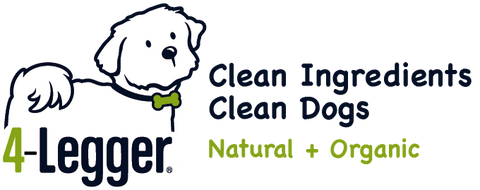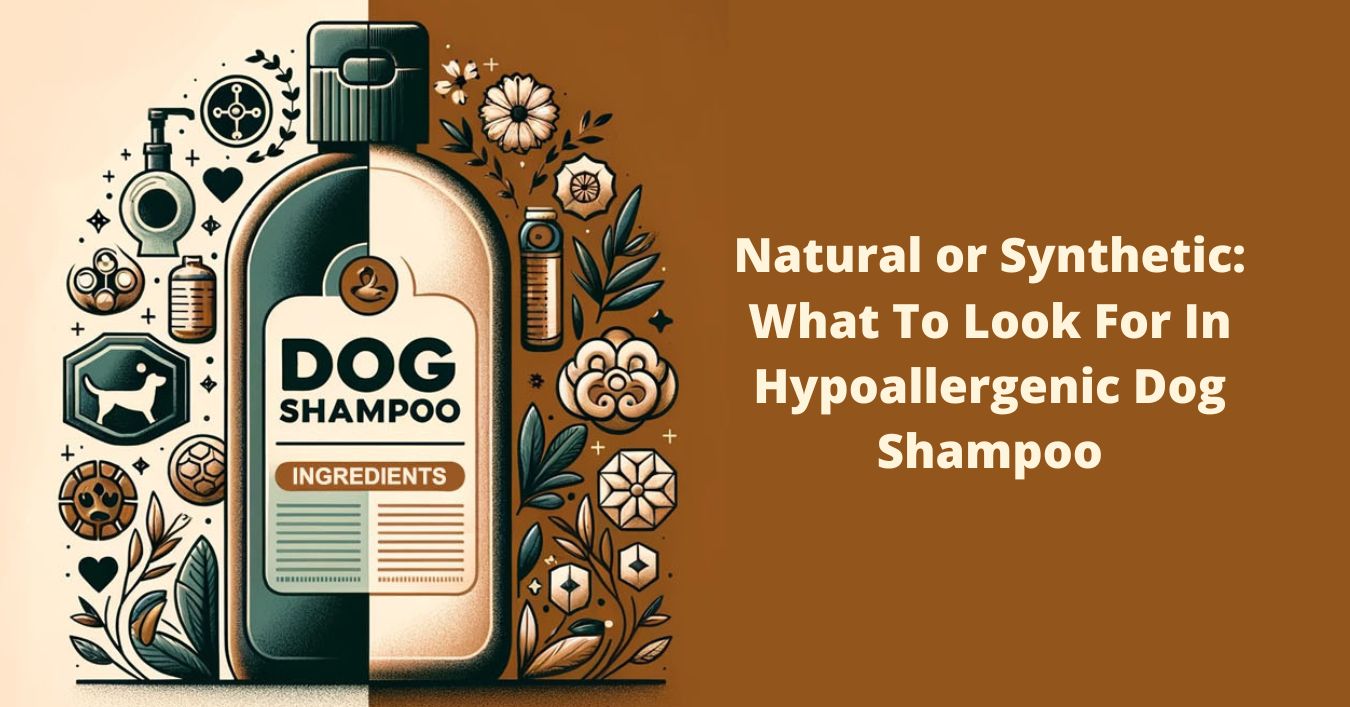Natural or Synthetic? What to Look for in Hypoallergenic Dog Shampoo
Choosing the right shampoo for your dog is an essential part of their grooming routine, but with so many options on the market, it can be overwhelming.
If you are looking for puppy shampoo for the newest addition to your pack or you have a dog with sensitive skin, one of the critical decisions you'll need to make is whether to opt for a hypoallergenic dog shampoo that uses minimally processed plant ingredients or one that is made with synthetic ingredients.
In this article, we'll explore the benefits and drawbacks of both options, helping you make an informed choice for your dog's well-being.
Understanding Hypoallergenic Dog Shampoo
Hypoallergenic dog shampoos are formulated specifically for dogs with sensitive skin or allergies, and for puppies that are still progressing through developmental stages.
These shampoos are designed to minimize the risk of allergic reactions, skin irritations, and other adverse effects that can result from bathing your puppy or adult dog with products containing harsh or irritating chemical ingredients.
In our article, "What is Hypoallergenic Dog Shampoo" we defined what makes a hypoallergenic dog shampoo more gentle and mild and we looked at a product being marketed as hypoallergenic to reveal the truth about the links between itchy skin and ingredients.
Notably, the key factor in choosing a hypoallergenic dog shampoo was the ingredients used in the formulation and whether those ingredients had links to allergies, itchy skin, or another issue.
Synthetic Chemicals or Minimally Processed Plant Ingredients?
During World War I and World War II there was a shortage in plant oils which led to the raw materials being synthesized into chemicals with similar cleaning properties.
These new detergents required less raw material and were less expensive to manufacture which of course meant more money in the pockets of the manufacturers.
When manufacturers introduced clever marketing with catchy jingles in the 1950s and 1960s, the popularity of detergent based cleansers soared.
The invention of detergents led to even more types of ingredients being introduced to make the products work better, smell better, look better, or last longer. Things like:
- Emulsifiers
- Conditioning agents
- Fragrances
- Colors
- Humectants
- Preservatives
Chemicals Aren't All Bad
As we all know, not all detergents or synthetic chemicals are bad (although many are). Here’s a practical example of how a safe chemical can interact in an undesirable way with a not-so-safe chemical:
Glyceryl Stearate SE - C99H196KNaO16 is not a bad chemical, but it is a penetration enhancer meaning it can increase the absorption of ingredients across the skin barrier. So, while I'd not worry about that being in a product, I would want to make certain ALL of the ingredients that are in the bottle with this chemical are safe and non-toxic.
DMDM Hydantoin is a chemical used as a preservative - C7H12N2O4. It does have links to itchy skin, allergies and it is a form of slow releasing formaldehyde which has links to cancer.
So, if Glyceryl Stearate SE and DMDM Hydantoin were in the bottle together, would I use it?
No way.
The Glyceryl Stearate would help the DMDM Hydantoin cross the skin barrier to enter into the body where it may cause long term damage to the body through the process of bioaccumulation. DMDM Hydantoin not only bioaccumulates, but it also gets stronger over time increasing the risk for cancer.
The key is to know which chemicals have links to negative side effects or are bad for the environment and which chemicals are truly safe and non-toxic.
4-Legger developed the Pet Shampoo Ingredient Database to help pet parents make informed decisions about the ingredients they put on the bodies of their fur family.
We encourage you to look up all ingredients in your dog's shampoo and conditioner to make certain they are truly safe and non-toxic before you use them on your dog.
The Case for Natural Ingredients
It is no surprise to anyone who knows about 4-Legger that we prefer natural ingredients.
When we were thinking about starting 4-Legger in 2014, we sat down and made a list of ingredients that we'd never put in our shampoo.
What we learned from looking at our list was that to make a truly safe and non-toxic dog shampoo we needed to do things very differently from other manufacturers.
Here are the reasons why we chose to make a truly all natural dog shampoo:
-
No Toxic Long Term Side Effects: Truly natural shampoos do not contain chemicals that have links to toxicities making them a safer option for your pet and less likely to strip your dog's coat of their natural skin and coat oils.
-
Minimally Processed: Truly natural ingredients should be minimally processed before they are put into the bottle minimizing the opportunity for contamination and lowering the impact on the environment.
-
Gentle on Sensitive Skin: Natural ingredients such as aloe vera, lemongrass essential oil, hemp oil, and coconut oil are known for their soothing properties so they are an excellent hypoallergenic dog shampoo option. They can help calm and moisturize your dog's skin and are ideal for dogs with sensitive or irritated skin.
-
Minimal Allergenic Potential: Natural ingredients are less likely to cause allergic reactions or irritations compared to synthetic chemicals. This is especially important if your dog is prone to allergies.
-
Environmentally Friendly: Many natural ingredients are biodegradable and environmentally friendly, reducing the impact on the planet.
The Biggest Drawbacks of Natural Ingredients
- Natural ingredients are more prone to to be sensitive to light, air, and temperature. On average, dog shampoo, even a truly all natural dog shampoo, has an expiration of 2-3 years but natural shampoos are simply more sensitive to the environment as they do not contain strong preservatives. So, if exposed to direct sunlight or high temperatures they will change over time,
- Sensitivity to a specific ingredient. Some dogs may have a sensitivity to an ingredient even if it is all natural. For example, while rare, some dogs may have a sensitivity to ingesting coconut oil. It doesn't necessarily mean the dog would be sensitive to saponified coconut oil used topically on the outside of their body, but it is possible.
- More expensive. Made with organic or all natural ingredients, you aren't going to find a truly natural bottle of dog shampoo for $4.99. The ingredients - oils, essential oils, and herbs are simply more expensive than chemicals.
- Not marketed as "Tear Free”. While we urge pet parents to be wary of "tear free" claims, you won't find a truly natural dog shampoo marketed as tear free because the pH of the product will be more alkaline than the tissue and tears in the eye. It won’t damage the eye but it also won’t feel great until the dog’s natural tears have flushed it out. You should always be very careful washing your dog's face even with a so-called tear free shampoo as it likely contains chemicals that can cause subtle but long term damage to the eyes which by far negates any perceived advantage of irresponsibly marketed “tear free” products.
- Can react with concrete or pavers or other man-made materials like decking to create a white-ish film over the surface if washing your dog outside. While 4-Legger is 100% biodegradable, the shampoo will react with the salts and minerals and oils on the surface of these types of materials and will need to be immediately washed off after a bath. When using a truly natural shampoo, you should not bathe your dog on your patio or deck when bathing outside but rather in the yard itself where the shampoo can break down in the soil, which is the definition of biodegradable!
Considering Chemical Ingredients
-
Effective Cleaning: Chemical-based (detergent) shampoos are formulated to be very effective in removing dirt and grime from your dog's coat.
-
Not As Sensitive to Temperature and Light: Synthetic-chemical shampoo (detergent) is not as sensitive to temperature and light and the appearance of the shampoo over time is less likely to change.
-
Less Expensive: Chemicals used to make detergent based shampoos are less expensive than truly natural ingredients so the product should be less expensive.
- Less Irritating to Eyes (in the short term): Your dog is less likely to have an immediate reaction if they get shampoo in their eye - but unfortunately, many of these chemicals are linked to sensory organ toxicity with longterm use and can create visual developmental issues with puppies and young dogs as well as cataracts in senior dogs.
The Drawbacks of Chemical Ingredients
-
Links to Toxicity: Some ingredients do have links to toxicity. You need to do your research on EVERY ingredient in the bottle to make sure they are all safe and non-toxic before you use a product on your dog.
-
Potential Irritation: Chemicals like sulfates, parabens, and artificial fragrances can irritate your dog's skin, especially if they have sensitive skin or allergies.
-
Environmental Concerns: Many synthetic chemicals are not environmentally friendly and can have a negative impact on aquatic ecosystems when they wash down the drain.
- Potential Contaminants: Some synthetic chemicals contain contaminants like 1,4-dioxane which have links to cancer. Long term use of these synthetic chemicals on your dog exposes them to a wide variety of environmental toxins and subsequent health risks.
Wrap Up
When it comes to choosing between natural ingredients and synthetic chemicals in hypoallergenic dog shampoos, there is no one-size-fits-all answer. Ultimately, it is a decision you make for your dog and will be influenced by the priorities you have regarding convenience and cost over safety and longterm health.
Do you spend a little more money and get a truly all natural dog shampoo or a synthetic chemical (detergent) based hypoallergenic dog shampoo? Note: many of the most expensive, boutique shampoos are detergent based even though they’re often marketed as natural and organic. The price tag alone should never be the deciding factor.
Have the chemicals been purified of contaminants from the manufacturing process? This is a bit rhetorical because the manufacturer probably isn’t going to tell you even if they know!
Do you trust the manufacturer? Do the disclose their entire ingredient list? If not, or you’re not sure - why would you trust them?
If your dog has sensitive skin or is prone to allergies, a hypoallergenic shampoo with natural ingredients is absolutely the better choice. On the other hand, if your dog happens to be allergic to a particular natural ingredient (which is rare) you may have to search a bit more to find a natural shampoo that doesn’t create a trigger for your dog.
Regardless of your choice, always read the label, do your research, consider the long term exposure of the ingredients on your dog's skin as well as those ingredients that are absorbed and potentially bioaccumulate in the body..
Remember, a clean and healthy dog is a happy dog, and making the best shampoo choice is a step in the right direction towards their long term health and well-being.





